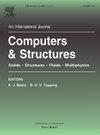A Cepstrum-Informed neural network for Vibration-Based structural damage assessment
IF 4.4
2区 工程技术
Q1 COMPUTER SCIENCE, INTERDISCIPLINARY APPLICATIONS
引用次数: 0
Abstract
Data-driven methods for vibration-based Structural Health Monitoring (SHM) have gained significant popularity for their straightforward modeling process and real-time tracking capabilities. However, developing complex models such as deep neural networks can pose challenges, including limited interpretability and substantial computational demands, due to the large number of parameters and deep layer stacking. This study introduces a novel Cepstrum-Informed Attention-Based Network (CIABN) developed to model power cepstral coefficients of structural acceleration responses, guided by cepstrum-based physical properties to facilitate efficient structural damage assessment. The CIABN integrates three key components: a unique input–output mapping based on weighted cepstral coefficients, a novel cepstral positional encoding mechanism, and a multi-head self-attention mechanism. The unique input–output mapping enables appreciable model generalization in overall structural characteristics, with the weighted cepstral coefficients serving as informative and compact data for efficient neural network modeling. The developed cepstral positional encoding scientifically guides the model to capture the coefficient indices, and the underlying trend of cepstral coefficients primarily governed by overall structural characteristics. The multi-head attention mechanism enables computationally efficient parallel analysis of interdependencies among coefficients, facilitating the development of a lightweight network. The effectiveness and superiority of the method have been validated using both simulated and experimental structural data.
基于振动的结构损伤评估的倒频谱信息神经网络
基于振动的结构健康监测(SHM)的数据驱动方法因其简单的建模过程和实时跟踪能力而大受欢迎。然而,开发复杂的模型(如深度神经网络)可能会带来挑战,包括由于大量参数和深层堆叠而导致的有限可解释性和大量计算需求。本研究介绍了一种新颖的基于倒频谱的注意力网络(CIABN),该网络以结构加速度响应的功率倒频谱系数为模型,以基于倒频谱的物理特性为指导,促进高效的结构损伤评估。CIABN 集成了三个关键部分:基于加权倒频谱系数的独特输入输出映射、新颖的倒频谱位置编码机制和多头自注意机制。独特的输入输出映射使模型在整体结构特征上具有明显的通用性,而加权倒频谱系数则为高效神经网络建模提供了翔实而紧凑的数据。所开发的倒频谱位置编码能科学地指导模型捕捉系数指数,而倒频谱系数的基本趋势主要受整体结构特征的支配。多头关注机制实现了系数间相互依赖关系的高效并行分析计算,促进了轻量级网络的发展。该方法的有效性和优越性已通过模拟和实验结构数据得到验证。
本文章由计算机程序翻译,如有差异,请以英文原文为准。
求助全文
约1分钟内获得全文
求助全文
来源期刊

Computers & Structures
工程技术-工程:土木
CiteScore
8.80
自引率
6.40%
发文量
122
审稿时长
33 days
期刊介绍:
Computers & Structures publishes advances in the development and use of computational methods for the solution of problems in engineering and the sciences. The range of appropriate contributions is wide, and includes papers on establishing appropriate mathematical models and their numerical solution in all areas of mechanics. The journal also includes articles that present a substantial review of a field in the topics of the journal.
 求助内容:
求助内容: 应助结果提醒方式:
应助结果提醒方式:


